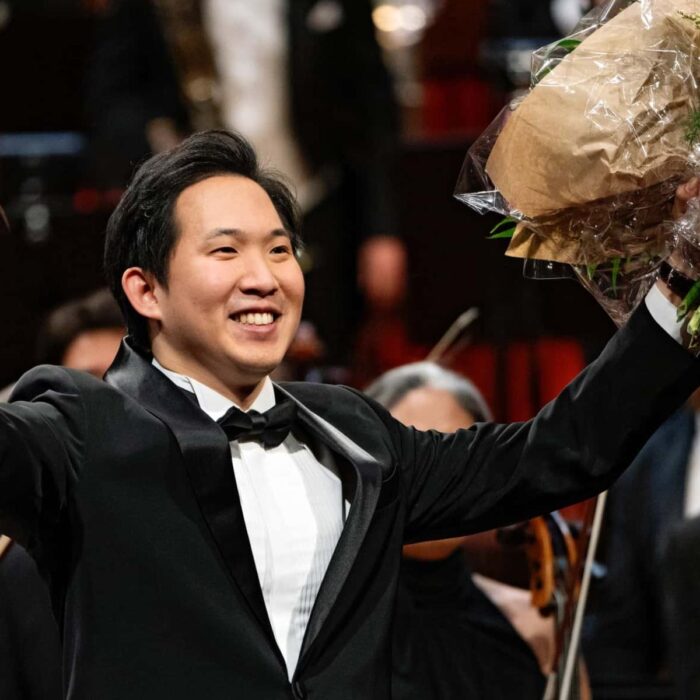
MCANA Announces Winner of Third Annual Award for Best New Opera
By Chris RuelThe Music Critics Association of North America (MCANA) has bestowed its Third Annual Award for Best New Opera to composer Ellen Reid and librettist Roxie Perkins for “p r i s m.”
Reid and Perkins will be honored at a July 26 Award Ceremony at Tanglewood during MCANA’s Annual Meeting.
The MCANA Award for Best New Opera is the only award of its kind in North America, and one of a handful of awards worldwide honoring both the composer and librettist for outstanding new work.
The 2019 Award Committee consisted of co-chairs Heidi Waleson, opera critic of “The Wall Street Journal,” and George Loomis, contributor to the “Financial Times” and “Musical America.” Arthur Kaptainis of the “Montreal Gazette” and “Ludwig van Toronto;” John Rockwell, former critic and arts editor of “The New York Times,” and co-New York correspondent of “Opera(UK);” and Alex Ross, music critic of “The New Yorker,” rounded out the prestigious panel of critics tasked with the selection.
“p r i s m” premiered on November 29, 2018, as part of Los Angeles Opera’s Off Grand Series. In a statement regarding the opera’s selection, MCANA pointed to composer Ellen Reid’s composition, calling it “…arresting…broad in its stylistic range and rich in its solo vocal, choral and orchestral palette…”
For Reid, the MCANA Award for Best New Opera is the second major award she has won this year. The composer was presented with the 2019 Pulitzer Prize in Music this past spring.
Librettist Roxie Perkins’ story of the devastating psychological fallout of sexual assault explores how the human mind processes and retains memories of trauma, using color as a device reflective of the mental chaos left in the wake of sexual trauma. Perkins’ tale is a haunting one, and her poetic style infuses the narrative with an eerie beauty as a mother (Lumee) and her daughter (Bibi) deal with the devastating residual effects of Bibi’s assault at a club. Perkins’ use of color as an emotional/memory trigger throughout the piece is autobiographic, reflecting her own experience with post-traumatic stress disorder.
The runners up for this year’s award are “An American Soldier” by composer Huang Ruo and librettist David Henry Hwang; and “Proving Up” by composer Missy Mazzoli and librettist Royce Vavrek.
The Nomination and Selection Process
OperaWire reached out to co-chairs George Loomis and Heidi Walseon regarding the nomination and selection process.
Per Waleson, “There is usually at least one person from the committee who has seen each of the operas nominated; those people report on the works they’ve seen. For each of the finalists, we get scores, libretti, and video (preferably) or audio recordings, and everyone uses those.”
Once nominations are submitted and reviewed, the committee narrows the field to six entries. “This is done by consensus,” Waleson added. “Once everyone has perused all of the finalists’ material, we have a conference call to discuss them, and then we vote.”
As one can imagine, within a group of five of the world’s top critics, there are plenty of opinions. According to Waleson, “The conversations are indeed robust—people have their favorites, and argue strongly for them—but so far, all our choices have been works that everyone can get behind.”
Overall Trends in New Opera
John Fleming, MCANA’s current president, considers the current time as “a golden age for new opera.”
However, new operas face strong headwinds, according to Fleming. “The number of opera premieres in the last decade or so in the United States and Canada has been impressive, and the number of emerging composers and librettists equally so. But getting an opera out to audiences beyond a premiere can be a slow, frustrating process unless the work was co-commissioned by several companies committed to staging it.”
Fleming also notes a pattern emerging in contemporary opera: film has become a go-to source for composers and librettists. Operas such as “Cold Mountain,” “Dead Man Walking,” and “Marnie” spring readily to mind.
Whereas some contemporary operas have pushed beyond their premieres and flourished perhaps in part because of their recognizability from the world of film, Fleming points out similarities among influential new works. “In terms of themes, the most successful recent operas have been smaller-scaled and leanly, often idiosyncratically orchestrated—chamber operas, for the most part—and intensely psychological, as in the way the legacy of trauma from sexual assault was evoked in ‘p r i s m.’… I especially admire ‘p r i s m’ because it’s a completely original work, not adapted from a movie or play or novel.”
Categories
News

